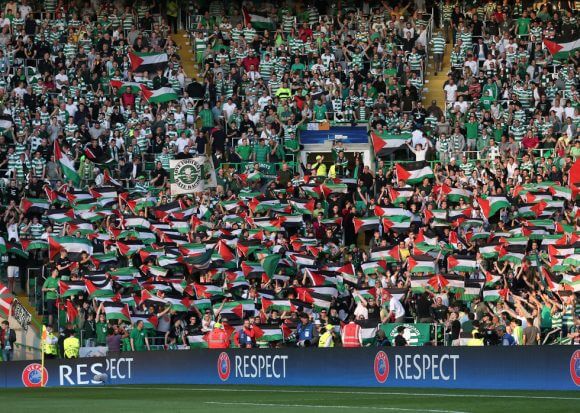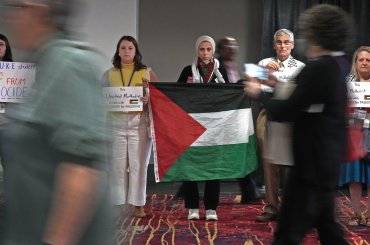What good have flags ever done?
Have they ever protected a city from the shrapnel of a bomb?”
asked Palestine’s most famous revolutionary poet, the late Mahmoud Darwish.
Often described as “the national poet of a nationless people,” Darwish was a humanist above all, and consistently warned against the trappings of nationalism, even as he bemoaned the absence of “normalcy,” of the feeling of belonging, of having a recognized homeland, for Palestinians. The Palestinians should not need to say “our country is loftier and more beautiful than yours,” he wrote, and will hopefully one day only need to fly the flag “on the football pitch,” and “on Nakba day.”
The tension Darwish elaborated on is one many activists for justice in Palestine navigate daily, as we engage in the struggle to secure the human rights of a dispossessed people denied dignity, sovereignty, and freedom, by a settler-colonial state. And while of course many would love to see a Palestinian nation-state, a country with its own full-fledged seat at the UN, its own currency, borders, and laws, and a flag proudly and freely flying over a sovereign parliament, a smaller group of us are most interested in the transnational concepts of anti-imperialism and global decolonization.
For those of us who strive to rise above nationalism, our activism for justice in Palestine is rooted in a belief in justice and equal rights for everyone, everywhere. And despite the routine accusation of “singling out Israel” for criticism, few if any of us are “single-issue” people. We organize against structural systems of oppression everywhere we see them, and we strive to keep learning about all the ways they manifest that are not yet obvious to many. If you ask us what issues we care about, most of us would list multiple causes. The alliances being forged or reinforced today, between African-Americans, Native Americans, and Arab Americans, between Israelis and Palestinians, are proof that we come together despite a long history of forced colonial borders and national divisions between us, to work towards a more seamless world, one that cannot be represented by the flags of the countries whose citizenship we carry.
And yet we celebrated with millions around the world when Celtic FC fans flew the Palestinian flag at a game in Glasgow against Israel’s Hapoel Be’er Sheva, and when St Etienne fans followed suit one week later, also flying the flag at a game against an Israeli team, the notoriously racist Beitar Jerusalem, which has a “no Arab players” policy.
Those events were not about nationalism. The Palestinian flag has come to symbolize defiance to censorship, a rejection of the Zionist narrative that would have people believe Israel is “defending itself” rather than brutally maintaining its occupation and apartheid policies, and grassroots opposition to state violence, to colonialism, to brutal military oppression. This was eloquently stated by the organizers of the Celtic FC “Fly the Flag for Palestine, for Celtic, for Justice” event, as they explained that their action was intended to display their “opposition to Israeli Apartheid, settler-colonialism and countless massacres of the Palestinian people.” “We stand for justice, for freedom and end to all forms of racism and oppression,” the organizers wrote.
Flying the Palestinian flag, then, is somewhat different from merely wearing a kuffiyeh, which can be culturally appropriated without sufficient political analysis, and even, at times, with no political analysis at all. A traditional piece of clothing that is regional, rather than national, the kuffiyeh acquired its political significance in the 1930s under the British mandate, when Palestinian peasants and Bedouins who had moved into the cities, as well as long-time city dwellers, started wearing it to express their resistance to the British and Zionist plans for Palestine. However, the kuffiyeh is now such a popular item amongst hipsters of all stripes that its meaning has become overly diluted. And as we saw multiple times, the kuffiyeh can readily be made into a fashion accessory, and even Israeli designers have appropriated it for their on “Israeli wear,” just as Euro-Americans have appropriated Native American designs for their “American wear.” More egregiously, there is even a wannabe “Israeli kuffiyeh” with the Star of David woven design, a pitiful and counterproductive imitation that perfectly illustrates Zionist cultural theft, the desperate attempt to claim such traditionally Palestinian items as falafel, hummus, and the kuffiyeh, as Israeli. But it is inconceivable that any Zionist, even one with a Star of David kuffiyeh, will ever wrap themselves in the Palestinian flag.
Don’t get me wrong. I love my kuffiyeh, and will continue to wear it, even after Palestine is free. My kuffiyeh is an aspect of my culture I do not seek to dissociate from. But the flag is different. With its overt reference to nationalism, it is a symbol whose multifaceted political significance I can occasionally, and still very reluctantly, get behind, for the duration of this struggle, but which I intend to continue to question long after Palestine is rid of Zionism. Because, as Darwish put it,
How grand the idea,
How small the state!
As we realistically look at the future of Palestine, with the global diaspora of half its people, and the multi-generational presence, on our land, of Zionist settlers and anti-Zionist Israelis who know no other country, we must understand that justice for the Palestinian people is not about the “state,” it is about the “idea,” of liberation, an end to exile, to disenfranchisement, to racism, and state-sanctioned violence and discrimination. The idea of a free Palestine transcends the flag.



and what good have national anthems done?
have they protected anyone from drone strikes?
have they helped bring about a just and peaceful world?
Oh, but they lift one’s spirit
make us proud to be an American
unleash tears
make life worthwhile
but at the same time
render us oblivious to
the body counts from these perpetual wars
the never ending racism at home
since once a chorus of “the land of the free and the home of the brave”
casts its magic spell
we’re lost in blissful reverie
a momentary high
so utterly inappropriate
ghastly, actually
considering
what is being inflicted upon us
upon the world
in our names
by our government
meanwhile, we’re in this trance
which is why quarterback Colin Kaepernick wouldn’t stand up for our national anthem
it’s like at the line of scrimmage
to wake us up
to break the trance
he’s audibilizing a new play
telling us that when America becomes the land that it claims to be
with liberty, equality and justice for all
then he’ll stand up
but until then he’ll remain seated
and so should we
RE: “St Etienne fans followed suit one week later, also flying the flag at a game against an Israeli team, the notoriously racist Beitar Jerusalem, which has a ‘no Arab players’ policy.” ~ Nada Elia
MY COMMENT: Actually, Beitar Jerusalem’s policy might best be described as “Jews only”, although an Israeli Druze might be tolerated.
SEE – “Suspicion and Hate: Racist Attacks On Arabs Increase in Israel”, By Julia Amalia Heyer, Spiegel Online, 6/05/13
ENTIRE ARTICLE – http://www.spiegel.de/international/world/racist-attacks-against-arabs-increase-in-israel-a-903529.html
Nicely done Ms. Elia.
Once again you beautifully translate a wispy poetic thought into prose with real world application.
I really enjoy your writing.
The green of the Palestinian flag is at one with our Irish flag,we have always had empathy and sympathy with the brave Palestinian people,and like the Irish they suffered and still suffer under the jackboot of racist colonists.Tiocfaidh ar la (our day will come).